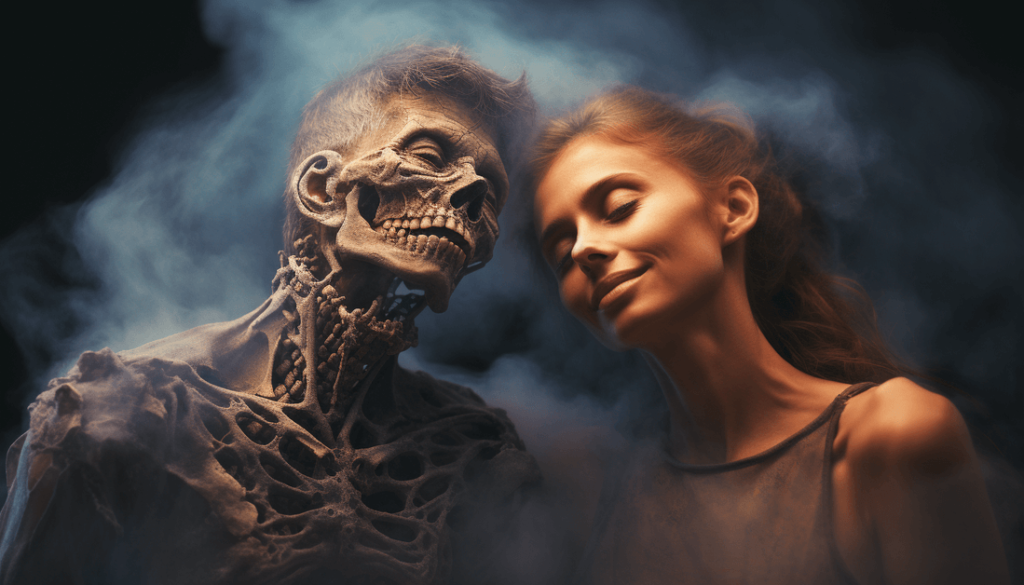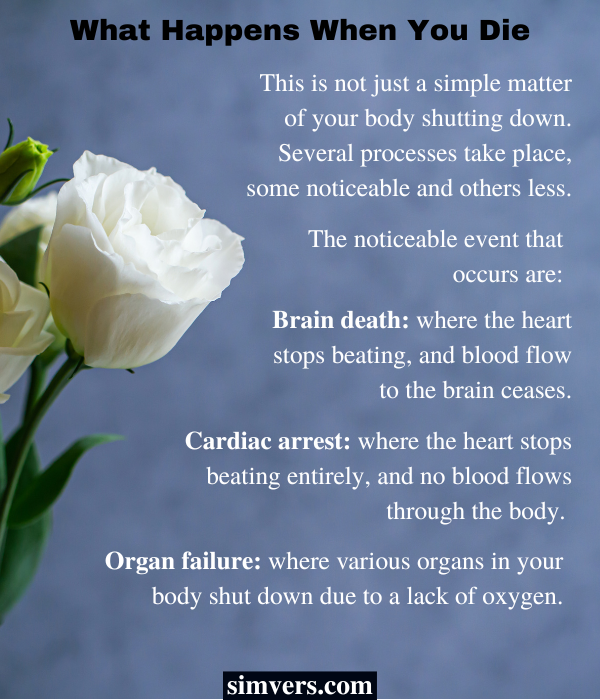
Death has always been a source of constant speculation and curiosity. Humans deeply desire to understand what happens when our bodies stop working and what happens after we die.
But this is something that science has not yet provided with certainty. Many scientists are still working on theories to explain what happens when we die. And even though we don’t have all the answers, we know some things about death and what happens after it.
The events that occur when you die are more complicated than your body simply shuts down. Fortunately, these events don’t happen all at once; instead, they could take anywhere from a few hours to a few days to take effect.
This article looks at what we know about death, especially from the physical and biological perspectives. So, if you want to know what happens to your body before and after you die, keep reading!
What is the physical process of dying?

When we talk about the physical process of dying, we can break it down into three main stages. First, there is brain death, where the heart stops beating, and blood flow to the brain ceases.
Then there is cardiac arrest, where the heart stops beating entirely, and no blood flows through the body. Finally, there is organ failure, where various organs in your body shut down due to a lack of oxygen.
What happens in the weeks before death?
Most people don’t know about the weeks before death, but some things happen before you die. First, your body shuts down organ systems. For example, your heart rate decreases from 60 beats per minute to 40 or less.
You may experience changes in vision and hearing as well. The respiratory system slows down and becomes more shallow until you can no longer breathe alone.
You may also eat less and drink less during this time. Finally, your body’s temperature drops as you get closer and closer to death. This can cause some people to feel cold when they are dying.
What happens in the days before death?
During this time frame, your breathing will become even shallower and may even stop for a time. Your heart rate will become slow, and your body temperature may drop below normal.
You will also experience less urination than usual and fewer bowel movements or constipation than usual, depending on what you ate before you died.
What happens to your physical body when you die?
Death is a process. It’s not a single event that happens all at once. As your body dies, it goes through a series of changes. It starts with your breathing slowing down and becoming irregular.
You may even experience a moment of awareness to see what is happening around you. This is called “clinical death” because it does not mean that you are entirely dead yet; instead, it means that your brain has stopped working properly.
Finally, your heart stops beating completely, and your body becomes cold to the touch. Once this happens, you can no longer think or feel anything.
How long does it take to die?
Dying can take anywhere from minutes to several hours. It depends on many factors, including your age and health. Other things that can affect this time include whether you are experiencing pain or discomfort and how much blood loss there is.
The temperature of the surrounding environment, whether anyone nearby can perform CPR or other emergency procedures, and how much oxygen has been cut off from your brain can also affect how long it takes to die.
MORE:
- What is Lokai Bracelet?
- Stop Negative Thoughts
- Affirmations for Self-Love
- Seven Deadly Sins
- Positive Affirmations
What happens to your body before death?
Your body goes through several changes before the last moments of life. These include:
More sleep and less physical activity
Sleep during the period of death and normal sleep are different. Normal sleep helps your body to recover from stress and other problems, while sleep during death is primarily due to weakness and the body’s inability to stay awake.
As death approaches, your sleep is likely to become more frequent and deeper, which can cause you to feel drowsy or confused.
Decreased appetite and thirst
Since your body is getting weaker, your appetite and thirst may decrease. You may not feel like eating or drinking or only want a few bites or sips of food.
This can start weeks or months before your death. The reason is that your digestive system cannot process food as efficiently as it used to. The body’s energy is used for other purposes, such as maintaining your essential functions and keeping you alive.
If you eat or drink, it may cause nausea or vomiting because your body isn’t able to handle solid foods well anymore.
Inability to control your bowel and bladder
There is a decline in bladder and bowel control. You may not hold on after eating or drinking or having accidents. You may also have problems emptying your bowels because of decreased muscle tone in the pelvic area.
Sometimes, the reverse occurs, where you have difficulty holding on. Constipation often causes this and can lead to fecal impaction when stool backs up in your colon and rectum. It can cause pain in your abdomen or back when the stool finally passes through.
Breakdown of your muscles and skin
Weight loss is one of the most obvious signs of the dying process, but it isn’t just your waistline that changes. Your body breaks down muscle mass as well. This is a natural part of aging and death, but it can lead to weakness and loss of strength.
But even if your muscles aren’t getting smaller, they are becoming weaker because there are fewer blood vessels supplying them with oxygen-rich blood than there were when you were younger. As this happens, your skin becomes thinner and more fragile. You may notice that bruises form more easily and heal more slowly than they used to.
Withdrawal and detachment
Death can also affect your emotions having difficulty feeling positive emotions like joy, happiness, and pleasure.
It’s possible you’ll withdraw from friends and family and lose interest in things you once enjoyed. You may also find that your concentration levels are lower than usual.
The reasons for this may be related to the fact that your body is breaking down its components. And your hormones (which influence your emotions) are also getting depleted.
Declining or irregular vital signs
Your vital signs—heart rate, blood pressure, and respiratory rate—can also change during death. For example, your heart rate may slow down or become irregular.
Your blood pressure may drop below a safe level (hypotension), which could cause you to feel dizzy or lightheaded. And you may experience difficulty breathing (asthma attack), especially if you are stressed or have asthma before death.
Agitation
Sudden bursts of energy or agitation can sometimes occur during the dying process. This is usually a sign that your body is working hard to shut down and may result from neurotransmitters (chemical messengers) being released in large quantities.
A person experiencing agitation may exhibit unusual behavior, such as thrashing around, trying to get out of bed, or talking nonsense.
Changes in how you perceive your surroundings
Sensory changes are common in the dying process. You may experience heightened senses or impressions of bright lights, sounds, or colors. Your surroundings may also appear dreamlike.
Some people say they have a sense of weightlessness as if they are floating above their bodies and observing the world below.
Research suggests that these sensory perceptions result from changes in blood flow and oxygen levels in the brain. You may also experience euphoria, which can be described as a floating sensation or feeling of being weightless.
Periods of unconsciousness
As death approaches, you may experience periods of unconsciousness. These can last anywhere from a few seconds to several minutes.
When you regain consciousness, you may be confused, disoriented, and unable to remember what happened during this period.
However, some sensory abilities, such as hearing and touch, may survive unconsciousness. The world around you may seem to be whirling, or you may have the impression that you are floating or falling. Feelings of tranquility and calmness are possible side effects.
Changes in your breathing
Breathing patterns may change as death approaches. You may take more shallow breaths and breathe less often than usual. Your breathing may also slow down, become irregular, or stop altogether.
Some people report feeling like they are not getting enough air; others say their chest is being squeezed tightly.
The buildup of carbon dioxide causes this in your blood. Your heart rate may slow down, and you may feel cold because blood vessels near your skin narrow due to decreased oxygen levels.
What happens to your body after death?
Your body continues to experience various changes after you die, and they include:
Your muscles relax
Muscle relaxation is the most noticeable change after death. Your body becomes limp, and you may fall into a slump or slump forward if you are sitting up. This is called post-mortem relaxation. The chemicals that keep your muscles tense break down after death.
Your temperature drops
As your heart stops beating, your body temperature drops. This drop in temperature happens quickly and can be as much as 1.5 degrees Fahrenheit within an hour of death.
The rate at which your body cools depends on air temperature, humidity, and other factors related to the environment where you die.
Your blood gets pulled downward.
Gravity pulls your blood down, and this happens more quickly after death. The blood flows from your brain and other body parts and pools at the lowest point. This can cause a purple discoloration of the skin called lividity, also known as livor mortis or post-mortem stain.
Your body stiffens
As your body cools, a chemical reaction called rigor mortis sets in. This causes your muscles to stiffen and lock in place. Your body will stay locked this way until it decomposes or is moved.
Your body loosens again.
The final process that happens after death is the loosening of your muscles. This happens because your nervous system no longer signals them, and they gradually relax as the body cools.
Will you feel pain when you are dying?
If you are dying, you may feel pain. But this is not a guarantee you will feel pain.
Pain is a sensation felt when the brain perceives damage to the body. When you die, the brain is no longer functioning, so there is no way for it to know what is happening to your body.
Conclusion
What happens when you die? It’s not just a simple matter of your body shutting down. Several processes take place, some noticeable and others less so. Fortunately, these shifts don’t happen instantly; rather, they might take anywhere from a few hours to a few days to take effect, allowing you time to make necessary preparations.
Your family may go straight to your funeral immediately after your death; however, these processes still go on all the same.
MORE:
- Can Manifesting Be Dangerous?
- Can People With Tattoos Go To Heaven?
- What Is Grace
- What is Guided Meditation
- Jehovah Jireh Meaning In Hebrew Bible
